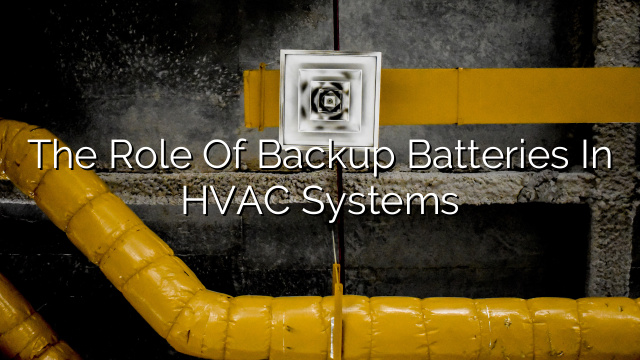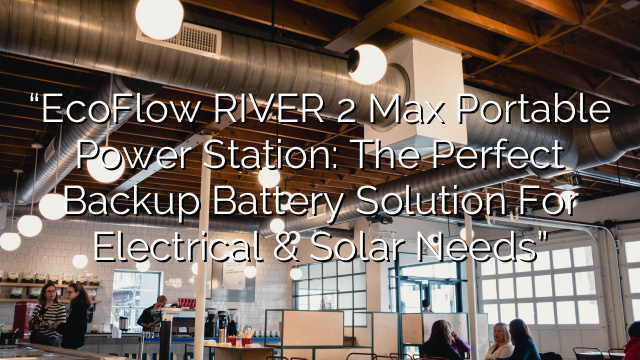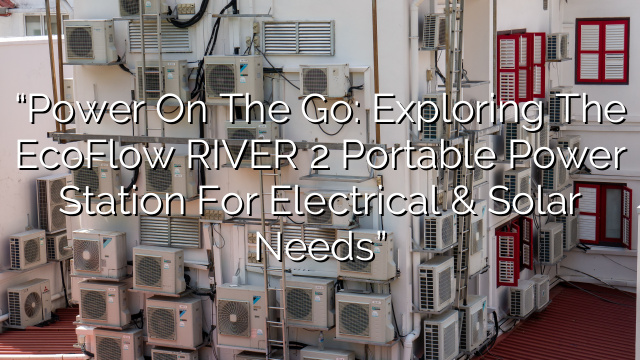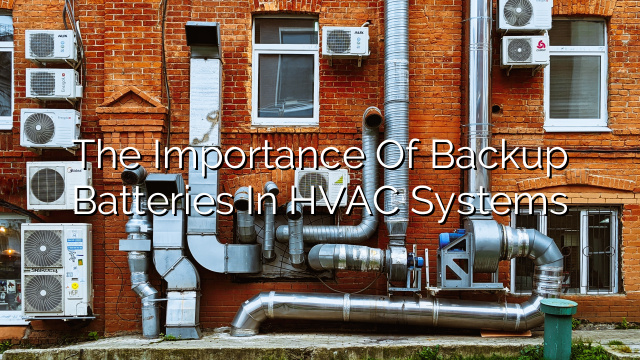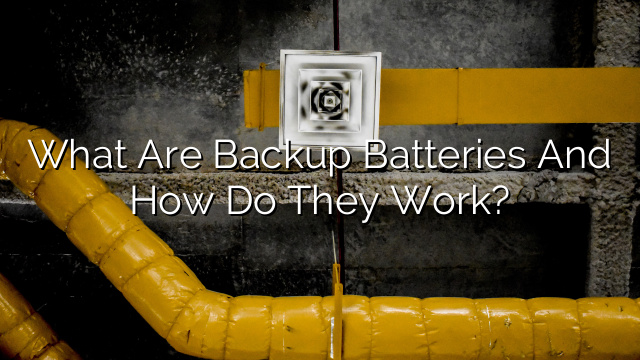The Role of Backup Batteries in HVAC Systems
In today’s modern world, where electricity is an essential part of our daily lives, backup batteries play a vital role in providing power during power outages or when there is a disruption in the electrical supply. This is true for all electronic devices and appliances, including HVAC (Heating, Ventilation, and Air Conditioning) systems. In this article, we will explore the role of backup batteries in HVAC systems and how they ensure continuous and uninterrupted operation.
Why Are Backup Batteries Needed in HVAC Systems?
HVAC systems are responsible for maintaining a comfortable indoor environment, regardless of the weather conditions outside. They regulate temperature, humidity, and air quality to ensure a pleasant and healthy living or working space. However, HVAC systems are heavily reliant on electricity to function properly. In the event of a power outage, the HVAC system can completely shut down, leaving the occupants vulnerable to extreme temperatures and poor air quality.
This is where backup batteries come into play. They act as a power source during power outages and ensure that the HVAC system continues to operate, providing conditioned air to the indoor space. Backup batteries provide the HVAC system with temporary power until the main electrical supply is restored or until an alternative power source, such as a generator, takes over.
Types of Backup Batteries Used in HVAC Systems
There are various types of backup batteries that can be used in HVAC systems. The choice of battery depends on factors such as the size and capacity of the HVAC system, the expected duration of power outages, and the specific requirements of the system. Some common types of backup batteries used in HVAC systems include:
- Lead-acid batteries: Lead-acid batteries are one of the oldest and most widely used types of backup batteries. They are affordable and have a relatively long lifespan. However, they require regular maintenance and can be sensitive to temperature fluctuations.
- Lithium-ion batteries: Lithium-ion batteries have gained popularity in recent years due to their high energy density, long lifespan, and low maintenance requirements. They are more expensive than lead-acid batteries but offer better performance and reliability.
- Nickel-cadmium batteries: Nickel-cadmium batteries are known for their durability and ability to withstand extreme temperatures. They have a long cycle life and can provide backup power for extended periods.
How Backup Batteries Work in HVAC Systems
Backup batteries are typically connected to the control panel of the HVAC system. When there is a power outage, the control panel automatically switches to battery power, ensuring that the HVAC system continues to operate. The backup batteries supply power to critical components of the HVAC system, such as the blower fan, control board, and thermostat.
During normal operation, the backup batteries are charged by the main electrical supply. This ensures that they are always ready to provide backup power when needed. Depending on the size of the backup battery and the power requirements of the HVAC system, the backup batteries can provide power for a few hours to several days.
The Benefits of Backup Batteries in HVAC Systems
Backup batteries offer several benefits when incorporated into HVAC systems. Here are some of the key benefits:
- Continuous operation: Backup batteries ensure that the HVAC system continues to operate even during power outages, providing continuous comfort and air quality to the indoor space.
- Protection against extreme temperatures: In regions with extreme weather conditions, a power outage can lead to dangerously high or low temperatures inside buildings. Backup batteries help maintain a comfortable indoor temperature until the main power supply is restored.
- Reduced downtime and loss: In commercial settings, a power outage can lead to significant financial losses due to disrupted operations. Backup batteries in HVAC systems minimize downtime and prevent loss of productivity.
- Emergency preparedness: Backup batteries in HVAC systems contribute to overall emergency preparedness, ensuring that essential systems continue to function in times of crisis or natural disasters.
- Longer equipment lifespan: HVAC systems that are equipped with backup batteries experience fewer disruptions and power-related issues, which can prolong the lifespan of the equipment and reduce the need for frequent repairs.
FAQ
Here are some frequently asked questions about backup batteries in HVAC systems:
Q: How long do backup batteries typically last in HVAC systems?
A: The lifespan of backup batteries in HVAC systems can vary depending on factors such as the type of battery, usage patterns, and maintenance. However, on average, backup batteries can last between 3 to 5 years.
Q: Can backup batteries be used with all types of HVAC systems?
A: Backup batteries can be used with most types of HVAC systems, including central air conditioning systems, heat pumps, and ductless mini-split systems. However, it is always recommended to consult with a professional HVAC technician to ensure compatibility and proper installation.
Q: Are backup batteries expensive to maintain?
A: The maintenance requirements and costs of backup batteries can vary depending on the type of battery used. Lead-acid batteries require regular maintenance, such as checking fluid levels and cleaning terminals. On the other hand, lithium-ion batteries have minimal maintenance requirements. It is important to consider the long-term costs of maintenance when choosing a backup battery for an HVAC system.
Conclusion
Backup batteries play a crucial role in HVAC systems, offering peace of mind and uninterrupted comfort during power outages or disruptions in the electrical supply. They provide temporary power to critical components of the HVAC system, ensuring continuous operation and protecting the indoor environment from extreme temperatures. By investing in backup batteries, homeowners and businesses can safeguard their HVAC systems and ensure optimal performance and comfort.

